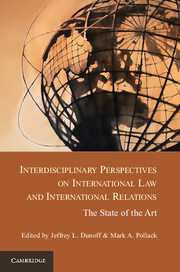 Interdisciplinary Perspectives on International Law and International Relations
Interdisciplinary Perspectives on International Law and International Relations Published online by Cambridge University Press: 05 January 2013
In a major, theoretically oriented political science department in the mid-1990s, a young scholar proposed a dissertation topic that would focus on a detail of international law. In response, a very prominent international relations (IR) professor told the student that such a dissertation would probably yield no interviews, let alone any job offers. Such was the state of the discipline just a mere decade and a half ago – IR scholarship had “evolved” to the point at which international law was foreign! Although this advice went unheeded, it contained a profoundly important kernel of wisdom: if IR scholars were going to take international law (IL) seriously, they needed to be shown that a detail of international law could matter for something really important. Guess what? It turns out the details of international law matter for the things IR scholars care about: when and how international cooperation occurs and is maintained.
Contemporary international cooperation scholars for quite some time ignored international law. The early institutionalist literature, starting with and building on Krasner (1982) and Keohane (1984), still had to fight the uphill battle of whether international institutions matter, given the more fundamental debate over the possibility of cooperation. Prominent realists argued that concerns of states about relative gains and their position in the international system greatly inhibit the prospects for international cooperation (Grieco 1988; Mearsheimer 1994). The institutionalist literature, by contrast, emphasized the possibility to realize absolute gains from cooperation; that is, cooperation could be framed as a positive sum, rather than a zero sum, game. Keohane's After Hegemony (1984), for instance, takes Waltz's realist assumptions as a given and shows that cooperation can be maintained through international institutions even in the absence of a hegemon providing goods. Institutions, from this vantage point, facilitate and stabilize cooperation. In particular, institutions reduce transaction costs and provide an arena for regular communication, thereby fostering interdependencies and opportunities for (informational) exchange. And, by collecting and disseminating information, information asymmetries and uncertainties, often inherently hostile to cooperation, are resolved. These mechanisms help to maintain cooperation even in the adverse circumstances of an anarchic international environment.
To save this book to your Kindle, first ensure [email protected] is added to your Approved Personal Document E-mail List under your Personal Document Settings on the Manage Your Content and Devices page of your Amazon account. Then enter the ‘name’ part of your Kindle email address below. Find out more about saving to your Kindle.
Note you can select to save to either the @free.kindle.com or @kindle.com variations. ‘@free.kindle.com’ emails are free but can only be saved to your device when it is connected to wi-fi. ‘@kindle.com’ emails can be delivered even when you are not connected to wi-fi, but note that service fees apply.
Find out more about the Kindle Personal Document Service.
To save content items to your account, please confirm that you agree to abide by our usage policies. If this is the first time you use this feature, you will be asked to authorise Cambridge Core to connect with your account. Find out more about saving content to Dropbox.
To save content items to your account, please confirm that you agree to abide by our usage policies. If this is the first time you use this feature, you will be asked to authorise Cambridge Core to connect with your account. Find out more about saving content to Google Drive.